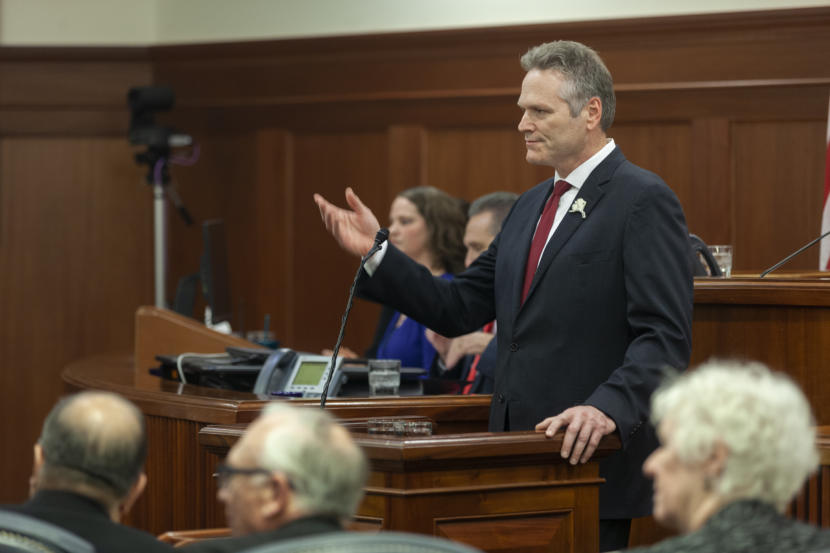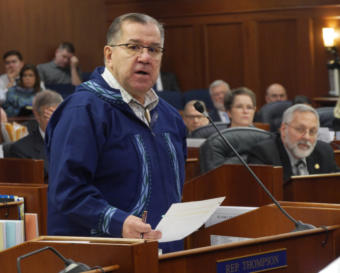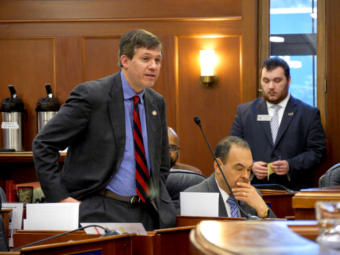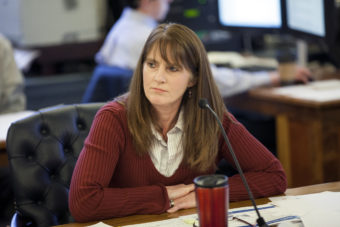
The Alaska Legislature and Gov. Mike Dunleavy have both talked in the first two weeks of the session about the importance of closing the gap between how much the state government spends and how much it brings in. But there are big differences in how to fix the problem.
Dunleavy proposed a budget with a $1.55 billion deficit. The proposal received a vocal response from the Senate Finance Committee on Tuesday.

Bethel Democratic Sen. Lyman Hoffman asked administration budget officials for budget solutions. He said the fact that Dunleavy hasn’t proposed more cuts this year is a sign that the state needs new revenue.
“Instead of working with us and finding solutions, you’re saying that we will not look at additional revenue from the industry, which is a large amount, which is going into a fight with one hand tied behind our backs,” Hoffman said.
Anchorage Democratic Sen. Bill Wielechowski has proposed cutting back the credits oil and gas companies receive that lower how much they have to pay in taxes. That’s also the subject of a proposed ballot initiative.

Anchorage Republican Sen. Natasha von Imhof said that administration officials have only listed state services as driving the state budget up, and not permanent fund dividends. She said that wrongly sets up a choice.
“Are we going to cut education to pay a permanent fund dividend?” von Imhof said.
She said she supports changing the PFD formula so that dividends would be $1,000, which would close the majority of the budget gap.
Dunleavy has emphasized the three constitutional amendments he proposed last year. One would limit state spending increases. Another would require public votes for new or increased taxes. And one would require public votes to change the permanent fund dividend formula.

When the governor was asked a year ago whether he would support public votes on eliminating services, he said it was too late in the budget year.
Asked about it again on Friday, Dunleavy said: “I’ve been thinking about your question all year long. And I think it may have merit, to fully engage Alaskans in all of this.”
Dunleavy said it could be included in an advisory vote by residents.
“It would be very interesting if that was part of it,” Dunleavy said. “So I’m not opposed to it.”
Members of the House and Senate majorities have said that legislators are elected to make major budget decisions.
The amendments wouldn’t balance the budget. But Dunleavy said they would put limits that would restrain spending in the future.
He hasn’t proposed making the same cuts as last year. His last budget would have cut roughly a quarter of school funding; add more cuts to the ferry system and university; ended state support for municipal debt to pay to build schools; and transferred oil property and fish taxes from municipalities to the state.
On Thursday, in response to a question about whether he still supported those cuts, Dunleavy said: “Well, I made those reductions to reduce the budget, because we don’t have the money.”
Those cuts wouldn’t have completely closed the budget. And one of the biggest cuts — to Medicaid — won’t happen without getting approval from the federal government. That hasn’t happened.
Legislators have been unclear on what, if any, major changes to laws that affect the budget will happen this year.
The Senate Finance Committee is scheduled to discuss a law to limit spending increases on Tuesday. Dunleavy will hold public meetings in Petersburg on Monday and Wrangell on Tuesday.
Watch the latest legislative coverage from Gavel Alaska.
